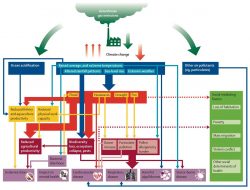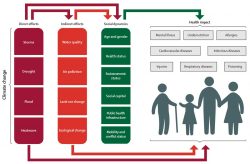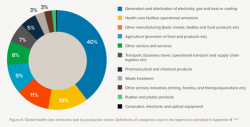Planet
July, 2019, was the hottest month since global records began in 1880.
Carbon dioxide (CO2) concentrations are at record levels. Like many other greenhouse gases (GHG’s), these gases trap energy in our atmosphere.
Global mean surface air temperature has risen by over 1°C since the turn of the 20th century, an increase which is already impacting human health and health systems. It is likely to reach 1.5°C between 2030 and 2052 if it continues to increase at the current rate. As detailed by the World Health Organisation, temperatures rising beyond 1.5°C will have severe consequences for human health.

People
Public concern is also heating up. Aware that the world’s response to the climate crisis has so far been dangerously insufficient, a youth-led movement is sweeping the globe demanding a healthy response to climate change.
Healthcare providers, concerned for their patients, families, and profession, are mobilising, but with climate change not yet covered in curricula, many are not sure what the highest impact action items are. Coda is here to help us start pulling in the same direction.
Lives are at stake
Continued warming puts human health at direct risk from wildfires, extreme heat, poor air quality, increasing weather-related disasters, and changes in vector-borne disease patterns such as Dengue Fever and Malaria. It also increases the potential for more indirect impacts involving undernutrition, drought, and spirals of dysfunction contributing to conflict and migration.
Climate change will not impact everyone equally, and can widen existing disparities in health outcomes between and within populations.
“CLIMATE CHANGE IS ONE OF THE DEFINING ISSUES OF OUR TIME. IT IS ALSO ONE OF THE WORLD’S MOST URGENT HEALTH THREATS…”
WHO Director Genera, Dr Tedros, Sept 11, 2019
Healthcare – The Front Line
Health systems are not immune from these effects, as emergent evacuation of healthcare facilities related to floods and wildfires, and disruption to the supply chains of key supplies such as normal saline has already shown. The high emissions pathway the world is currently on has the potential to disrupt core public health infrastructure and overwhelm health services within the lifetime of today’s children.
Healthcare is part of the problem—which means we are part of the solution
The first global estimate of health care sector emissions, completed August 2019, calculated that the healthcare sector produced 2 gigatons of carbon dioxide equivalent in 2014, or 4.4% of all global greenhouse gas emissions.
If health were a country it would be the planet’s 5th largest emitter!
That’s a lot of emissions under our control.
How does the health sector contribute to climate change?
Estimates of the carbon footprint of healthcare systems in high-income countries range from a high of 10% of total national carbon emissions in the United States, to 7% in Australia, to 4.6% in Canada.
Hospital-based healthcare contributes to 44% of the total healthcare carbon footprint, compared with 6% from community and public health, and the 4% that general practice (family medicine) contributes.
Investment in preventative and primary care is not only resource efficient and good for population health, it is also a way to reduce the carbon footprint of care.
Different areas of healthcare contribute to emissions, as demonstrated in the figure below.
The NHS has demonstrated that it is more than possible to reduce GHG emissions from healthcare – by 18.5% from 2007 to 2017 in CO2e emissions—in the face of an increase in clinical activity.
Some of these emissions come from inside healthcare systems themselves, though many are generated from the supply chain, and from electricity sources themselves. We will need to work at home, in healthcare settings, and in the community to generate the healthy response to climate change our patients and children require.
Act together and we all win
We will have the greatest impact if we act together. This will not only create change in our communities, but will provide a strong signal to global policymakers and capital markets that change is coming.
Health has 3 huge things in our favour to help us move the dial on the climate crisis.
- Framing climate change in terms of human health has been shown to be the best way to motivate populations to action.
- Health providers are amongst society’s most trusted messengers
- Many of the measures that decrease greenhouse gas emissions are essential public health and preventative medicine manoeuvers that also improve present-day health and decrease healthcare costs:
Reducing the amount of fossil fuels burned in transportation, heating and electricity production will decrease the 7 million yearly deaths worldwide from air pollution.
Getting to where we want to go by on foot or by bike decreases our chances of dying from heart disease, with cycling actually reducing all-cause mortality.
If we power those bikes with a plant-rich, low-meat diet, we will decrease our risk of colorectal cancer, heart disease, and diabetes
To this end, we have assembled a global, diverse team of experts from both within and outside healthcare to design a focused set of clear, achievable, sustainable and meaningful actions to be applied by health workers with the goal of improving health immediately, and in the future through decreased emissions. Some actions will target changes to personal or clinical practice, others will be focused at the hospital or health-systems level, and others will be taken in the broader community. The four areas of work are:

Energy

Transport

Purchasing

Food
These draft actions will be published and disseminated via social channels, and then we’ll be seeking your feedback. Your feedback will be distilled and then applied to the original expert designed actions, producing a community constructed set of actions. The final plans will then be presented at the Coda22 in April 2022.







